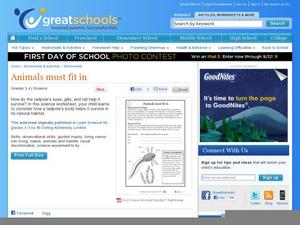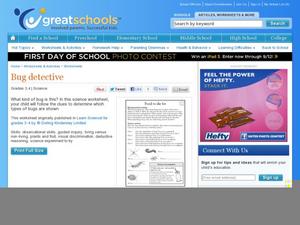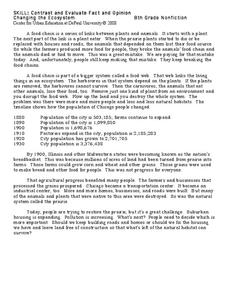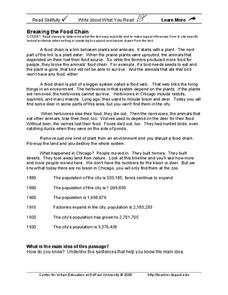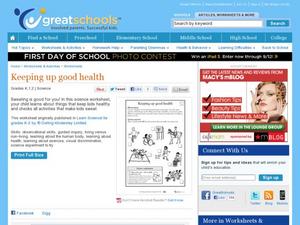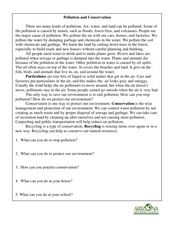Curated OER
Dinnertime for Animals
Is a deer an herbivore? What about a spider? Experiment with the food chain in an interactive science experiment. After listing the herbivores from a selection of animals, third and fourth graders compare the skulls and teeth of...
Curated OER
Animals Must Fit In
A instructional activity on tadpoles is here for your young biologists. Learners read a short paragraph on tadpoles, then answer three questions regarding how parts of their bodies help the tadpole to survive in the pond. There is a good...
Curated OER
An Elephant's Life
Here is an interesting worksheet that's all about elephants. In it, learners answer ten true-or-false questions about elephants, then respond to ten questions that come from a story about Daisy, the circus elephant. The questions should...
Curated OER
Animals in Danger
In this animals in danger worksheet, students read about animals in danger, choose the correct environment, answer multiple choice questions, match what the animals do, and more. Students complete 6 activities total.
K5 Learning
The Life Cycle
Studying plant, animal, or insect life cycles? Pair a science unit with a reading comprehension worksheet on life cycles. The passage touches briefly on butterfly, plant, frog, and dog life cycles before prompting readers to answer six...
Curated OER
Bug Detective
What happens when a living thing dies? After reading a paragraph of background knowledge on the life cycle of bugs, third and fourth graders work through four clues to figure out which bug is which. When they finish, they can study the...
Curated OER
Prairie Ecology Internet Activity
For this prairie ecology worksheet, students respond to 11 questions that require them to consult selected Internet sources and answer questions about prairie animals and their habitats.
Curated OER
Researching the Nutrient Cycle
In this researching the nutrient cycle worksheet, students read about the cycle of nutrients, look at the diagram, then answer two questions by doing research on this topic.
K12 Reader
Competing for Resources
Young biologists examine the concept of scarce resources with a reading comprehension passage. After finishing the paragraphs, learners turn to the questions to demonstrate what they have learned about what is beneficial and what is...
Curated OER
Mini-Ponds
In this mini pond worksheet, students create a mini-pond ecosystem with soil, water, and plant life. Students let their ecosystem sit for a day and they observe a sample the next day. Students identify all the pond water microorganisms...
Curated OER
The Life Cycle of a Flowering Plant
In this flowering plant worksheet, students will review vocabulary words associated with the life cycle of flowering plants. This worksheet has 7 matching and 3 short answer questions.
Curated OER
Explorit's Wetlands Quiz
In this wetlands worksheet, students complete a 31 question multiple choice on-line interactive quiz about wetlands. Included are questions about plants, animals and geography.
DePaul University
Contrast and Evaluate Fact and Opinion
How can you tell when an author is expression an opinion or stating a fact? Use two short reading selections to emphasize the difference between a statement that you can prove and one that you can't. The first passage explains food...
K12 Reader
Habitat Destruction
What happens when an animal becomes endangered or extinct? Explore the ways that human influence throughout the environment has threatened the existence of other species with a reading passage. After reading the paragraphs, kids answer...
Curated OER
Be Kind to Your Teeth
What kinds of food can be bad for your teeth? Kindergartners and first graders explore dental health with an interactive science inquiry. Given a choice of foods such as celery, cake, and milk, kids choose which ones are better for their...
DePaul University
Seasons on the Prairie
Fact and opinion passages inform readers about the seasons on the prairie and Zambia in Southern Africa. Then, test scholar's knowledge with multiple choice and short answer questions.
Curated OER
Everything is Made of Something
Young scientists can use this worksheet to learn about natural resources, as well as what we use them for. A word search prompts pupils to find sixteen words about natural resources.
DePaul University
Breaking the Food Chain
Throughout history, the growth of big cities has resulted in the destruction of ecosystems. In the case of Chicago, IL, a grassland that was once home to bison, deer, wolves, and foxes quickly became a booming city of over three million...
Curated OER
Food chains and webs
Here is an extremely simplistic look at food chains and webs. It depicts three different food chains, each containing a plant, plant eater, and meat-eater. Learners fill in the missing part of each chain by using the images provided at...
Curated OER
Keeping Up Good Health
During a discussion on sweating with your little ones, this resource should come in handy. Little learners place a check mark next to an activity pictured on the worksheet that would induce sweating. There are seven pictures to choose...
Curated OER
Butterfly Life Cycle
Focused little scientists will flitter their arms back and forth across the room with excitement as they learn the life cycle of a butterfly and how living things grow and change over time.
Curated OER
Pollution and Conservation
In this pollution and conservation worksheet, students read a passage on pollution and conservation, and answer short answer, multiple choice, and vocabulary matching questions. Students complete 27 questions.
Curated OER
Blowing In the Wind
In this wind dispersal worksheet, students read for information and comprehension. In this short answer and drawing worksheet, students answer six questions.
Curated OER
Connection to Fine Arts: Carbon-Dating Masterpieces
In this carbon dating worksheet, students read about how carbon-14 is used to date historical paintings. They answer questions about carbon dating and its importance.



